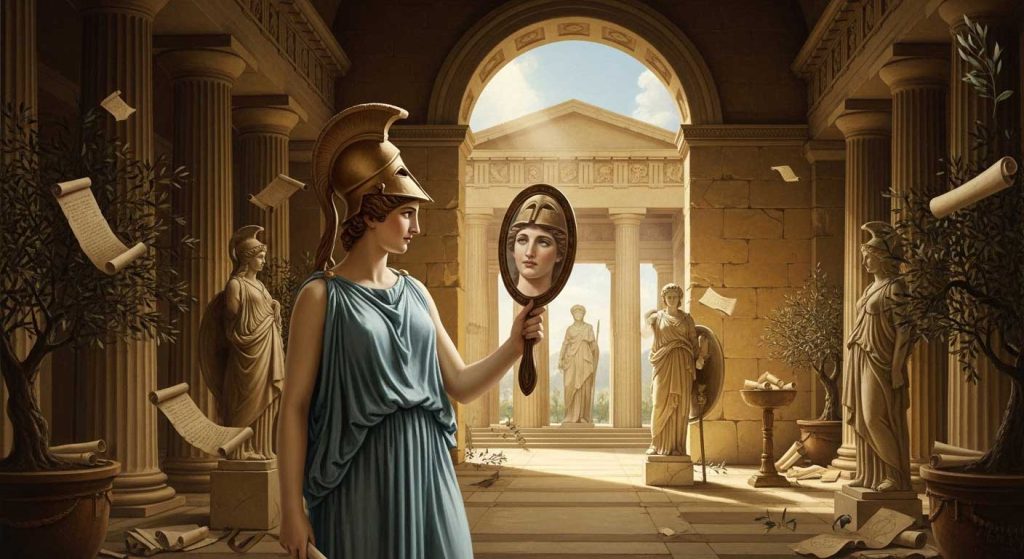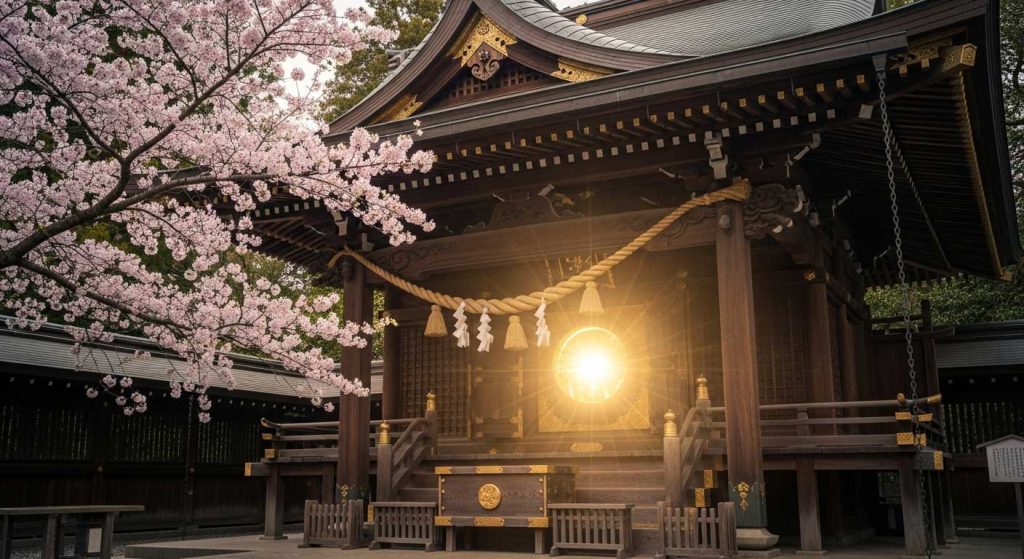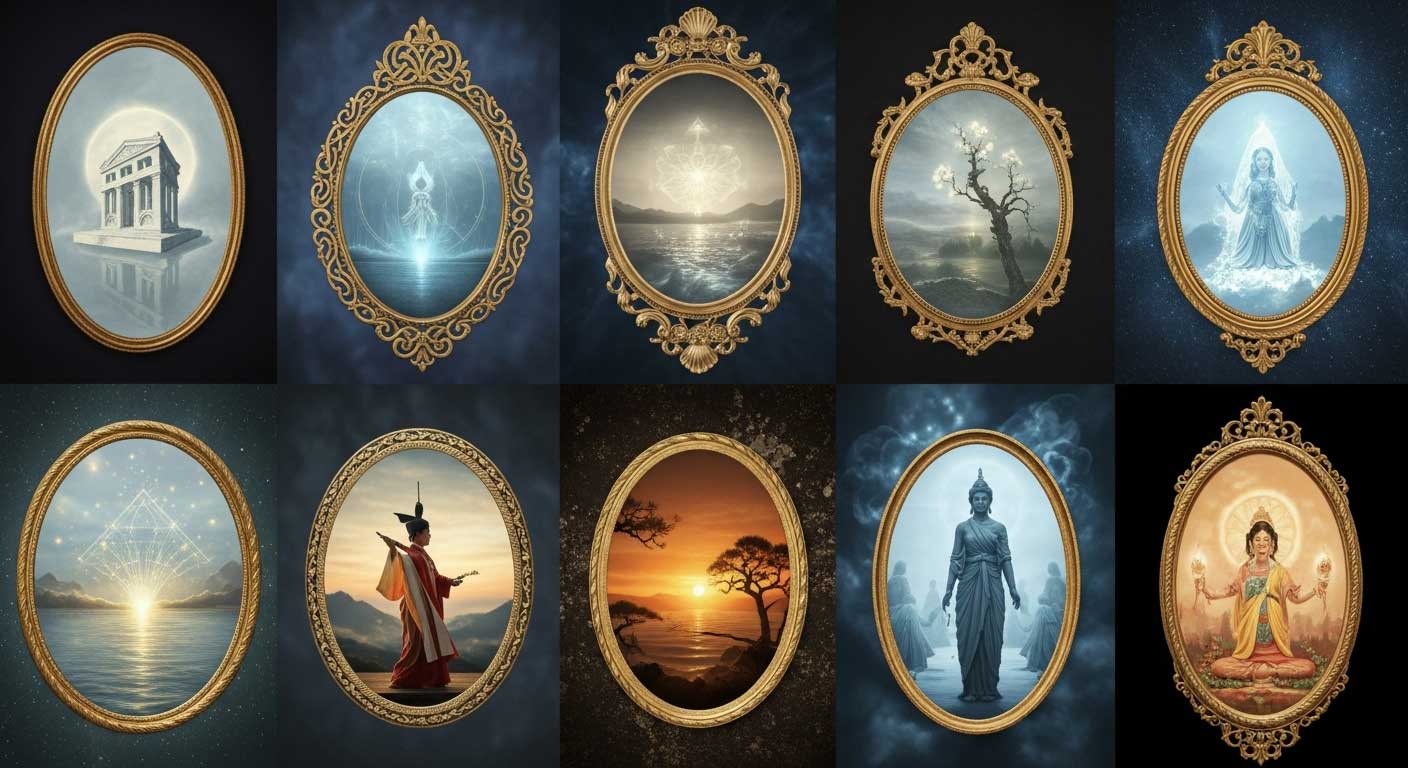The symbolism of mirrors in Greek mythology offers far more than just a surface image. In ancient Greece, mirrors—whether crafted from polished bronze, silver, or the stillness of a pool—were more than practical tools. They were profound symbols, representing truth, vanity, spiritual insight, and the duality of self-awareness. From famous mirrors in mythology to magic mirrors in folklore, the symbolism of a mirror has captivated cultures across centuries.
Let’s explore the seven most powerful interpretations of mirrors in mythology, with a strong focus on Greek mirror mythology, while also traveling across civilizations from Celtic to Shinto beliefs.
Narcissus and the Danger of Self-Obsession

No exploration of mirror Greek mythology is complete without Narcissus. In this Greek myth mirror story, a beautiful young man became entranced by his reflection in a still pool—a natural “Greek mirror” before glass existed. Unable to pull himself away, he wasted away into nothingness.
Advertisement
“Narcissus’ tale is a tragic mirror symbolism example—illustrating illusion, vanity, and the peril of unexamined self-obsession.”
This myth, a cornerstone of mirror in Greek mythology, birthed the modern term “narcissism.” It remains a cautionary reflection symbolism tale about how mirrors as a symbol can blur the line between reality and perception.
Explore more about Narcissus on Encyclopedia Britannica.
Divine Mirrors: Athena’s Strategic Reflection

In Greek mirror mythology, Athena’s association with reflective surfaces stands apart from the vanity of Narcissus. When Perseus faced Medusa, Athena gifted him a polished bronze shield—a Greek mirror in function—so he could see the Gorgon indirectly and avoid her petrifying gaze.
This mirrors symbolism highlights wisdom, foresight, and strategic thinking. While no known Greek god of mirrors exists, Athena in this role embodies the spiritual insight and intellectual clarity tied to mirror symbolism in Greek mythology.
The symbolism of mirrors in Greek mythology thus expands beyond vanity into insightful observation and divine wisdom.
Advertisement
Magic Mirrors in Global Mythologies
Magic mirrors in mythology are found far beyond Greece.
- Shinto (Japan): The Yata no Kagami, a divine mirror, is central to Japanese mythology mirror lore. It symbolizes truth and was used to lure the sun goddess Amaterasu from her cave.
- Celtic: Mirrors in mythology here were linked to scrying and portals to the Otherworld.
- Hinduism: A mirror symbolizes Maya—the illusion of the material world—and serves as a tool for enlightenment.
These mythology mirrors emphasize that across cultures, mirrors are more than objects—they’re conduits to deeper realities.
Read more on Japan’s Sacred Treasures.
Advertisement
Mirrors in Ancient Greece
Did they have mirrors in ancient Greece? Yes—polished bronze, copper, and silver mirrors were common, often with ornate handles. These Greek mirrors were sometimes engraved with mythological scenes, showing how deeply intertwined the symbolism of mirrors was with religion and daily life. In mirror Greek mythology, they reflected both the physical self and the soul’s truth.
Mirrors in Folklore, Fairytales, and Pop Culture
From Snow White’s magic mirror to modern fantasy, mirrors in folklore carry themes of truth and prophecy. The line “Mirror, mirror on the wall…” echoes the symbolism of mirrors as truth-tellers—a tradition reaching back to mirrors in mythology from every continent.
Advertisement
In modern culture, even games like Poptropica feature quests where players wonder how to get the mirror in Poptropica Mythology Island, highlighting the enduring power of this mystical symbol.
Feng Shui and Mirror Placement

Feng Shui teaches that mirrors reflect and redirect Chi (energy). The symbolism of a mirror in this context is tied to harmony, abundance, and spiritual well-being. Broken mirror symbolism meaning here relates to disrupted energy and loss of clarity.
Common Beliefs:
- Feng Shui mirror in bedroom: Considered inauspicious if it reflects the bed—can disrupt rest or relationships.
- Mirror in front of bed Feng Shui: May cause insomnia, anxiety, or third-party interference in relationships.
- Mirror in dining room Feng Shui: Positive if it reflects abundance (like food or guests).
- Mirror in front of door Feng Shui: Usually avoided as it may repel good energy entering the home.
Broken mirrors, in this context, carry negative energy and are believed to symbolize shattered clarity or broken luck.
What Does a Mirror Symbolize Spiritually and Psychologically?
The symbolism of mirrors has always hovered between the material and metaphysical:
| Concept | Symbolism |
|---|---|
| Truth | Clarity, reflection, spiritual honesty |
| Vanity | Narcissus, illusion, ego |
| Self-Realization | Clean mirror = enlightened mind |
| Spiritual Insight | Mirrors as portals to the divine |
| Reflection Symbolism | Seeing one’s inner or hidden self |
Broken Mirrors and Spiritual Meaning
The broken mirror symbolism meaning is one of the most persistent in folklore—often tied to bad luck. In Roman times, mirrors were believed to reflect the soul, so breaking one harmed that reflection. Yet in some cultures, this mirrors symbolism is reversed—broken mirrors release negative energies.
Conclusion: The Universal Power of Reflection
From the Greek mythology mirror of Narcissus’s fate to Athena’s strategic shield, the symbolism of mirrors in Greek mythology teaches that clarity depends not just on what we see, but how we interpret the reflection. Whether as tools of divine wisdom, portals to other realms, or symbols of vanity, mirrors in mythology remain timeless reminders of the link between perception and truth.
FAQs: The Symbolism of Mirrors in Greek Mythology and Other Cultures
What does a mirror symbolize in mythology?
A mirror symbolizes truth, illusion, vanity, and divine reflection, depending on the culture.
What is the symbolism of mirrors in Greek mythology?
In Greek myths, mirrors relate to self-obsession (Narcissus), strategic clarity (Athena), and truth versus illusion.
What does a broken mirror symbolize spiritually?
It can signify spiritual disruption, bad luck, or an opportunity to reflect and rebuild one’s self-perception.
Are mirrors spiritual in nature?
Yes. In Shinto, Feng Shui, and Celtic mythology, mirrors are tools for truth, spiritual insight, and connection to the divine.
Where should mirrors be placed in Feng Shui?
Avoid reflecting beds or doors. Ideal spots include near natural light sources or reflecting beautiful, abundant scenes like the dining table.












